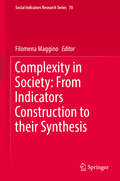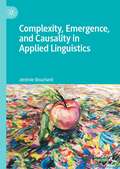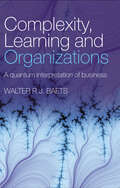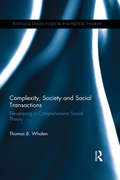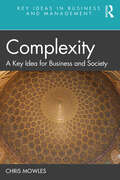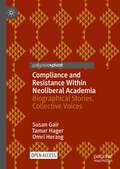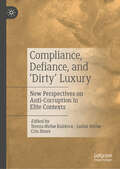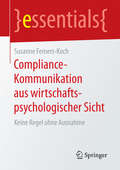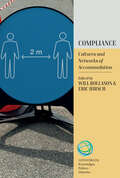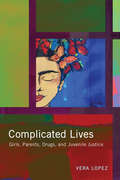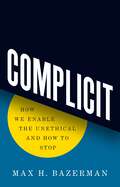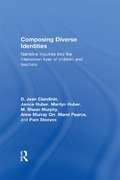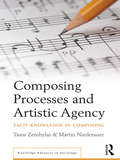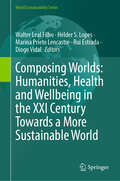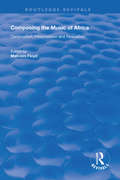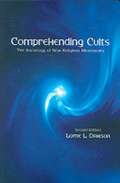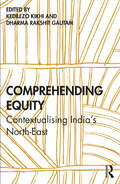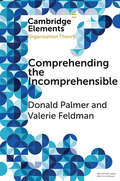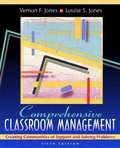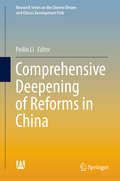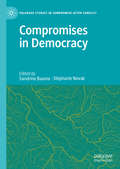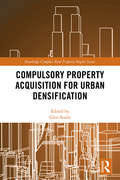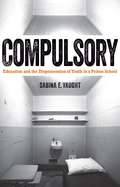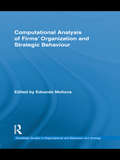- Table View
- List View
Complexity in Society: From Indicators Construction to their Synthesis (Social Indicators Research Series #70)
by Filomena MagginoThis volume discusses the many recent significant developments, and identifies important problems, in the field of social indicators. In the last ten years the methodology of multivariate analysis and synthetic indicators construction significantly developed. In particular, starting from the classical theory of composite indicators many interesting approaches have been developed to overcome the weaknesses of composites. This volume focuses on these recent developments in synthesizing indicators, and more generally, in quantifying complex phenomena.
Complexity, Emergence, and Causality in Applied Linguistics
by Jérémie BouchardThis book suggests that applied linguistics research is inherently concerned with complexity, emergence and causality, and because of this it also requires a robust social ontology. The book identifies and unpacks a range of conceptual issues in applied linguistics from a social realist perspective, and provides a critique of successionism and interpretivism as two dominant and enduring empiricist tendencies in the field. From this critique, it considers the emergence of complex dynamic system theory as viable yet not entirely unproblematic conceptual sophistication of current applied linguistics research. Although the growing popularity of complex dynamic system theory is undeniable and understandable, this book argues that its integration within a social realist ontology is necessary for further developments in the field. The book will be of interest to applied linguists and social scientists interested in language-related issues including language learning and teaching, language change, language policy and planning, bilingualism/multilingualism, and language and identity.
Complexity, Learning and Organizations: A Quantum Interpretation of Business
by Walter R.J. BaetsThis fascinating book argues for a new way of looking at the world and at human systems, companies or (Western) society as a whole. Walter R.J. Baets argues that we should let go of our drive to control, manage and organize, in order to be able to create an ideal environment for continuous learning, both for ourselves and for our collaborators. Arguing in favour of a holistic management approach, and very much in opposition to the short-term shareholder value driven approaches that are popular today, Baets’ book develops a logic founded in real life observations, examples and cases that every reader will recognize in their daily practice. It guides the reader to understand an alternative paradigm and allows them finally to be able to work with the dynamics of business on a daily basis. A must-read for students of complexity, strategy and organizational behaviour, this well-researched, well-argued book skilfully guides the reader through this interesting subject.
Complexity, Society and Social Transactions: Developing a Comprehensive Social Theory (Routledge Studies in Social and Political Thought)
by Thomas B. WhalenThis book develops and presents a general social theory explaining social, cultural and economic ontology and, as a by-product, the ontology of other social institutions and structures. This theory is called social transaction theory. Using the framework of the complex adaptive systems model, this transdisciplinary social theory proposes that society, culture and economy are emergent from social and environmental transaction and negotiation. Each transaction contains an element of negotiation. With each transaction, there is continual renegotiation, however small or large. Even if the result is no change, renegotiation takes place. Thus, there is a constant emergence of social constructions and a continuous reconstruction of society in the ‘specious present.’ Practices, beliefs, explanations, and traditions become part of the accepted canon of a group through continual social transaction. Deviations from canon and expected outcomes are managed through narrative. Narrative can be either rejected or accepted into the social canon of a group or society. This social theory applied Bhaskar’s critical realism to refine the several theoretical works that were utilized. These include complex adaptive systems, Mead’s social theory, Maslow’s hierarchy of needs, Strauss’s negotiated order theory, game theory, Bruner’s narrative and folk psychology, Giddens's structuration theory and Ricoeur’s interpretation theory. A transdisciplinary account of the emergence of society and culture and the role of narrative, Complexity, Society and Social Transactions will appeal to scholars and practitioners of social theory and sociology.
Complexity: A Key Idea for Business and Society (Key Ideas in Business and Management)
by Chris MowlesThis book interprets insights from the complexity sciences to explore seven types of complexity better to understand the predictable unpredictability of social life. Drawing on the natural and social sciences, it describes how complexity models are helpful but insufficient for our understanding of complex reality. Taking an interdisciplinary approach, the book develops a complex theory of action more consistent with our experience that our plans inevitably lead to unexpected outcomes, explains why we are both individuals and thoroughly social, and gives an account of why, no matter how clear our message, we may still be misunderstood. The book investigates what forms of knowledge are most helpful for thinking about complex experience, reflects on the way we exercise authority (leadership) and thinks through the ethical implications of trying to co-operate in a complex world. Taking complexity seriously poses a radical challenge to more orthodox theories of managing and leading, based as they are on assumptions of predictability, control and universality. The author argues that management is an improvisational practice which takes place in groups in a particular context at a particular time. Managers can influence but never control an uncontrollable world. To become more skilful in complex group dynamics involves taking into account multiple points of view and acknowledging not knowing, ambivalence and doubt. This book will be of interest to researchers, professionals, academics and students in the fields of business and management, especially those interested in how taking complexity seriously can influence the functioning of businesses and organizations and how they manage and lead.
Compliance als Treiber von Reputation: Eine empirische Analyse der Wirkung von Compliance-Kommunikation auf die Unternehmensreputation in Medien
by Ellen Dietzsch-LohbeckCompliance hat nach großen Wirtschaftsskandalen, wie Korruption bei Siemens und dem Abgasskandal in der deutschen Automobilindustrie, Einzug in fast jedes Unternehmen gehalten. Der Wert von Compliance wird häufig nicht nur darin gesehen, vor Rechtsverstößen und Fehlverhalten zu schützen, sondern auch den guten Ruf zu fördern. Das Buch beleuchtet die Frage, ob es sich für Unternehmen im Hinblick auf ihre Reputation in den Medien lohnt, Compliance als Thema in der Unternehmenskommunikation zu verankern. Anhand einer Fallstudie mit drei Automobilherstellern untersucht Ellen Dietzsch-Lohbeck die externe Kommunikation der Unternehmen zu Compliance. Ferner geht sie der Frage nach, ob die Compliance-Kommunikation der Unternehmen einen Einfluss auf die Wirtschaftsberichterstattung und auf die Medienreputation in drei überregionalen Tageszeitungen in Deutschland ausübt. Damit hat Ellen Dietzsch-Lohbeck erstmals das Thema Compliance in der externen Unternehmenskommunikation umfassend untersucht. Sie hat auch analysiert, wie Zeitungen das Thema Compliance bei Unternehmen darstellen und welche Medienreputation sie dabei vermitteln.
Compliance and Resistance Within Neoliberal Academia: Biographical Stories, Collective Voices
by Susan Gair Tamar Hager Omri HerzogThis book reflects on academic life under a neoliberal regime. Through collaborative autoethnographies, the authors share stories about the everyday experiences, dilemmas and conflicts of three academics: the struggle for promotion, teaching’s challenges, the race to publish, confronting bureaucracy and institutional politics, as well as the resulting emotional stress. These stories reveal the impact of neoliberal culture on ideological, economic, social, collegial, and emotional integrity which are integral to academics’ lives today. But along with the challenges, the authors present their vision of hope, and transformation through academic solidarity - and for the silenced voices to be heard, inside academia and beyond it.
Compliance, Defiance, and ‘Dirty’ Luxury: New Perspectives on Anti-Corruption in Elite Contexts
by Cris Shore Jardar Østbø Tereza Østbø KuldovaThis book interrogates the transnational field of (anti-)corruption and elite crime. Using the lens of luxury, art, and antiquities, the contributors reconceptualize the driving dialectics of corruption and anti-corruption. Compliance, Defiance and 'Dirty' Luxury brings together scholars across criminology, anthropology, sociology, and the humanities to tackle these dialectics from different angles and positions, digging deeper into these corrupt zigzags of compliance and defiance. This approach reveals a self-reinforcing, accelerating, neoliberal perpetuum mobile churning out a frenzy of public-private crime-fighting initiatives that stimulate the expansion of various control and surveillance architectures which time and again fail. This volume opens new theoretical and empirical paths of investigation for criminologists and anthropologists alike. While the book speaks primarily to academic audiences and graduate students, it also appeals to a broad range of professionals. Tereza Østbø Kuldova is Research Professor and a social anthropologist based at the Work Research Institute, Oslo Metropolitan University, Norway. Jardar Østbø is Professor and Head of Programme for Russian Security and Defence Policy at the Institute for Defence Studies, Norwegian Defence University College. Cris Shore is emeritus Professor of Anthropology at Goldsmiths University of London, UK, and currently Senior Research Fellow at the Institute for Advanced Study, Central European University, Hungary.
Compliance-Kommunikation aus wirtschaftspsychologischer Sicht: Keine Regel ohne Ausnahme (essentials)
by Susanne Femers-KochDieses essential stellt ausgew#65533;hlte psychologische Modelle zu Compliance und Non-Compliance vor, arbeitet Empfehlungen f#65533;r die Compliance-Kommunikation heraus und gibt Beispiele psychologisch versierter Kommunikationsma#65533;nahmen in Unternehmen. Hintergrund daf#65533;r ist die Erfahrung, dass Menschen bestimmte Regeln ignorieren, obwohl sie sie kennen und verstehen. Regelkonformit#65533;t ist psychologisch betrachtet nicht einfach durchzusetzen und psychologische Grundlagen #65533;ber Normkonformit#65533;t k#65533;nnen Compliance-Manager und -Kommunikatoren in ihrer Arbeit unterst#65533;tzen. Auf die Frage ,,Keine Regel ohne Ausnahme?" finden Compliance-Manager hier Antworten aus Sicht der Wirtschaftspsychologie.
Compliance: Cultures and Networks of Accommodation (Lifeworlds: Knowledges, Politics, Histories #3)
by Eric Hirsch Will RollasonExploring compliance from an anthropological perspective, this book offers a varied and international selection of chapters covering taxation, corporate governance, medicine, development, carbon offsetting, irregular migration and the building trade. Compliance emerges as more than the opposite of resistance: instead, it appears as a valuable heuristic approach for understanding collective life, as a means by which actors strive to accommodate themselves to others. This perspective transcends conventional distinctions between power and resistance, and offers to open up new avenues of anthropological enquiry.
Complicated Lives: Girls, Parents, Drugs, and Juvenile Justice
by Vera LopezComplicated Lives focuses on the lives of sixty-five drug-using girls in the juvenile justice system (living in group homes, a residential treatment center, and a youth correctional facility) who grew up in families characterized by parental drug use, violence, and child maltreatment. Vera Lopez situates girls’ relationships with parents who fail to live up to idealized parenting norms and examines how these relationships change over time, and ultimately contribute to the girls’ future drug use and involvement in the justice system. While Lopez’s subjects express concerns and doubt in their chances for success, Lopez provides an optimistic prescription for reform and improvement of the lives of these young women and presents a number of suggestions ranging from enhanced cultural competency training for all juvenile justice professionals to developing stronger collaborations between youth and adult serving systems and agencies.
Complicit: How We Enable the Unethical and How to Stop
by Max H. BazermanWhat all of us can do to fight the pervasive human tendency to enable wrongdoing in the workplace, politics, and beyondIt is easy to condemn obvious wrongdoers such as Elizabeth Holmes, Harvey Weinstein, and the Sackler family. But we rarely think about the many people who supported their unethical or criminal behavior. In each case there was a supporting cast of complicitors: business partners, employees, investors, news organizations, and others. And, whether we’re aware of it or not, almost all of us have been complicit in the unethical behavior of others. In Complicit, Harvard Business School professor Max Bazerman confronts our complicity head-on and offers strategies for recognizing and avoiding the psychological and other traps that lead us to ignore, condone, or actively support wrongdoing in our businesses, organizations, communities, politics, and more.Complicit tells compelling stories of those who enabled the Theranos and WeWork scandals, the opioid crisis, the sexual abuse that led to the #MeToo movement, and the January 6th U.S. Capitol attack. The book describes seven different behavioral profiles that can lead to complicity in wrongdoing, ranging from true partners to those who unknowingly benefit from systemic privilege, including white privilege, and it tells the story of Bazerman’s own brushes with complicity. Complicit also offers concrete and detailed solutions, describing how individuals, leaders, and organizations can more effectively prevent complicity.By challenging the notion that a few bad apples are responsible for society’s ills, Complicit implicates us all—and offers a path to creating a more ethical world.
Composing Diverse Identities: Narrative Inquiries into the Interwoven Lives of Children and Teachers (Teachers, Teaching and Learning)
by D. Jean Clandinin Janice Huber M. Shaun Murphy Pam Steeves Marilyn Huber Anne Murray Orr Marni PearceIn a climate of increasing emphasis on testing, measurable outcomes, competition and efficiency, the real lives of children and their teachers are often neglected or are too messy and intricate to legislate and quantify. As such, curricula are designed without including the very people that compose the identities of schools. Here Clandinin takes issue with this tendency, bringing together a collection of narratives from seven writers who spent a year in an urban school, exploring the experiences and contributions of children, families, teachers and administrators. These stories show us an alternative way of attending to what counts in schools, shifting away from the school as a business model towards an idea of schools as places to engage citizenship and to attend to the wholeness of people’s lives. Articulating the complex ethical dilemmas and issues that face people and schools every day, this fascinating study puts school life under the microscope raises new questions about who and what education is for.
Composing Processes and Artistic Agency: Tacit Knowledge in Composing (Routledge Advances in Sociology)
by Martin Niederauer Tasos ZembylasThis monograph carries out an in-depth investigation into compositional processes, shedding new light on the components and conditions that constitute artistic agency. Artistic agency relies on the interlocking of such activities that emerge from various propositional and non-propositional (experiential, corporeal, sensory) forms of knowledge - listening, feeling, imagining, trying out, reflecting, noting and correcting, which represents a small selection of the multifaceted composing activities. The book develops an understanding of artistic agency and mastery in its fundamentally social nature, through the important, though largely ignored output of creative compositional processes. Using a mixture of case studies and theoretical frameworks, this book will appeal to sociologists, musicologists, creative studies scholars, and artists, particularly those who teach composition or research on this topic, as well as students of MA- and PhD-level.
Composing Worlds: Humanities, Health and Wellbeing in the XXI Century Towards a More Sustainable World (World Sustainability Series)
by Walter Leal Filho Hélder S. Lopes Marina Prieto Lencastre Rui Estrada Diogo VidalThis book provides an interdisciplinary exploration of how the humanities, social sciences, and health sciences can contribute to addressing the pressing challenges of the Anthropocene. From climate change and biodiversity loss to environmental degradation and public health threats, the book examines the interconnected crises of our time and offers innovative frameworks for fostering sustainability, resilience, and equity. It highlights the cultural, ethical, and philosophical dimensions of these issues to underscore the importance of collaboration across disciplines to shape a just and sustainable future. Key topics include the role of art, literature, and philosophy in raising environmental awareness, the impact of urban green spaces on social participation and health, and the integration of mental health into sustainability discussions. The book also explores eco-anxiety, digital technologies, and citizen science as pivotal aspects of contemporary socio-environmental challenges. Through case studies and theoretical insights, it demonstrates the value of combining scientific expertise with cultural and ethical understanding to create effective solutions for global and local problems. This book is a valuable resource for researchers, students, policymakers, and practitioners in the humanities, social sciences, health, and environmental studies. It invites readers to rethink their relationship with nature and society while inspiring transformative actions that prioritize sustainability and equity. Whether addressing global crises or local community initiatives, this work offers practical insights and fresh perspectives for anyone committed to building a healthier, more sustainable future.
Composing the Music of Africa: Composition, Interpretation and Realisation (Routledge Revivals)
by Malcolm FloydFirst published in 1999, this volume explores the great diversity of music created by African communities is reflected in this book, which discusses the ways in which a wide range of musical forms are composed and performed from Egypt to South Africa and from Ghana to Kenya. As two composers explain here, this diversity provides much inspiration for western contemporary composition. Particular attention is paid to the contexts generate musical creativity. Ceremonies and festivals celebrating birth, death, marriage or rites of passage provide the impetus for much composition and performance, enabling young people to pick up, early on, some of the techniques and styles of which they then become the new exponents. The book also looks at the role played by formal music education programmes and bodies such as the South African Music Rights Organization and the South African Broadcasting Corporation in fostering musical activity, as well as the contribution of composers to the social and political changes that have dominated South African life in recent years.
Comprehending Cults: The Sociology of New Religious Movements
by Lorne L. DawsonComprehending Cults, Second Edition, provides a sociological interpretation of the phenomenon of new religious movements. While the author does not offer an apologia for cults--in either a religious or a sociological sense--he does attempt to replace suspicion and misinformation with a greater knowledge of the facts (as best we know them) and a measure of sympathetic understanding. <p><p> Completely revised and updated in this second edition, the book examines all aspects of cults, while striving to delineate the very real limits of our knowledge. In addition to dealing with the troublesome aspects of the subject, including issues of violence, sexuality, and brainwashing, the author also considers the possibility that new religious movements are a source of spiritual satisfaction to their members. Offering up-to-date social science research about contemporary religious cults, Comprehending Cults, Second Edition, is ideal for undergraduate sociology of religion and new religious movements courses.
Comprehending Equity: Contextualising India’s North-East
by Kedilezo Kikhi Dharma Rakshit GautamThis book interrogates the idea of equity in the context of India’s Northeast region. The region comprises of diverse ethnicities heralding different socio-political and historical contexts. The present volume attempts to bring to the fore, the ever-widening socio-economic gap between dominant and marginalized groups and the challenges of traversing towards equity and social justice in this context. The book looks at the socio-economic disparity and exploitation in the region conspicuous in the form of poor governance, ethnic violence, and a sense of marginalization and disillusionment. Based on case studies and research of different states and communities in the Northeast, the volume discusses the complex and unique socio-economic challenges of the people in the region. It analyses the issues of representation, identity and ethnic dominance, affirmative action, food security, sustainability, access to education, territorial conflicts, ineffective governance, among others. The book offers insights and perspectives into concepts such as equity, justice, fairness, and discrimination by juxtaposing the booming global economic order which depicts the extreme levels of deprivation especially among those belonging to the disadvantaged communities. This volume will be of interest to scholars and researchers of sociology, social anthropology, development studies, politics, law and governance, and South Asia studies.
Comprehending the Incomprehensible: Organization Theory and Child Sexual Abuse in Organizations (Elements in Organization Theory)
by Donald Palmer Valerie FeldmanThis Element describes child sexual abuse and the formal organizations in which it can occur, reviews extant perspectives on child abuse, and explains how an organization theory approach can advance understanding of this phenomenon. It then elaborates the main paths through which organizational structures can influence child sexual abuse in organizations and analyze how these structures operate through these paths to impact the perpetration, detection, and response to abuse. The analysis is illustrated throughout with reports of child sexual abuse published in a variety of sources. The Element concludes with a brief discussion of the policy implications of this analysis.
Comprehensive Classroom Management: Creating Communities of Support and Solving Problems
by Vernon Jones Louise JonesThis text for educators, administrators, and counselors investigates such influences on student behavior as interpersonal relationships in the class, the interaction between the school and the home, student motivation, and methods of instruction.
Comprehensive Deepening of Reforms in China (Research Series on the Chinese Dream and China’s Development Path)
by Peilin LiThis book covers key issues related to comprehensive reform in China in a broad range of areas, such as the economy, politics, culture, social management, the environment and CPC Party building. The insightful analyses will appeal to social science researchers interested in reform-era contemporary China, as well as both undergraduate and graduate students trying to understand this country better. Lawmakers and policymakers at different levels of government will find in the well-informed policy recommendations following the analyses a valuable source of reference and inspiration.
Compromises in Democracy (Palgrave Studies in Compromise after Conflict)
by Stéphanie Novak Sandrine BaumeThis book provides an interdisciplinary examination of the relationship between compromise and democracy. Compromises have played a significant role in our representative democracies and yet the nature of the relationship between compromise and democracy has generally raised tricky theoretical questions and generated ambiguous evaluations. This book focuses on the relationship between compromise and liberal democracies from both a cultural and institutional perspective and addresses new and lesser-explored aspects of the relationship. It explores a variety of topics including: compromise and in-commensurable values, antagonist paradigms, compromise and majority decisions, compromise and publicity, compromise and post-conflict societies, compromise and anti-system political parties, and compromise and the understanding of political representation. Compromises in Democracy offers an original perspective on the topic by assembling contributions from the fields of philosophy, sociology, political theory, political science and history of ideas.
Compulsory Property Acquisition for Urban Densification (Routledge Complex Real Property Rights Series)
by Glen SearleDensification has been a central method of achieving smart, sustainable cities across the world. This book explores international examples of the property rights tensions involved in attempting to develop denser, more sustainable cities through compulsory acquisition of property. The case studies from Europe, North America, eastern Asia and Australia show how well, or not, property rights have been recognised in each country. Chapters explore the significance of local legal frameworks and institutions in accommodating property rights in the densification process. In particular, the case studies address the following issues and more: Whether compulsory acquisition to increase densification is justified in practice and in theory The specific public benefits given for compulsory acquisition The role the development industry plays in facilitating, encouraging or promoting compulsory acquisition What compensation or offsets are offered for acquisition, and how are they funded? Is there a local or national history of compulsory property acquisition by government for a range of purposes? Is compulsory acquisition restricted to certain types or locations of densification? Where existing housing is acquired, are there obligations to provide alternative housing arrangements? The central aim of the book is to summarize international experiences of the extent to which property rights have or have not been protected in the use of compulsory property acquisition to achieve sustainable cities via urban densification. It is essential reading for all those interested in planning law, property rights, environmental law, urban studies, sustainable urban development and land use policy.
Compulsory: Education and the Dispossession of Youth in a Prison School
by Sabina E. Vaught&“This is an American story, unsettled by contradictions, constituted by unresolvable loss and open-ended hope, produced through brutal exclusivities and persistent insurgencies. This is the story of Lincoln prison.&” In her Introduction, Sabina E. Vaught passionately details why the subject of prisons and prison schooling is so important. An unprecedented institutional ethnography of race and gender power in one state&’s juvenile prison school system, Compulsory will have major implications for public education everywhere.Vaught argues that through its educational apparatus, the state disproportionately removes young Black men from their homes and subjects them to the abuses of captivity. She explores the various legal and ideological forces shaping juvenile prison and prison schooling, and examines how these forces are mechanized across multiple state apparatuses, not least school. Drawing richly on ethnographic data, she tells stories that map the repression of rightless, incarcerated youth, whose state captivity is the contemporary expression of age-old practices of child removal and counterinsurgency. Through a theoretically rigorous analysis of the daily experiences of prisoners, teachers, state officials, mothers, and more, Compulsory provides vital insight into the broad compulsory systems of schooling—both Inside prison and in the world Outside—asking readers to reconsider conventional understandings of the role, purpose, and value of state schooling today.
Computational Analysis of Firms' Organization and Strategic Behaviour (Routledge Research in Strategic Management)
by Edoardo MollonaThis book addresses possible applications of computer simulation to theory building in management and organizational theory. The key hypothesis is that modelling and computer simulation provide an environment to develop, test and articulate theoretical propositions. In general, computer simulation provides an experimental environment where researchers are able to play with symbolic representations of phenomena by modifying the model’s structure and activating or deactivating model’s parameters. This environment allows to both generating hypotheses to ex post explain observed phenomena or to ex ante generate distributions of unrealized events thereby envisioning areas for further empirical investigations. Under a methodological perspective, the volume investigates logics and techniques to design a research strategy grounded on computer simulation. In particular, the articles in the book concentrate on two different techniques, and philosophies, to set up a simulation study: System Dynamics, which is grounded on differential equations and feedback theory, and agent-based modeling. The book describes how computer simulation helps to look into research issues typical to strategic management and organizational theory. In this respect, such themes as firms’ diversification strategies, competitive strategy, rivalry and the impact of role dynamics on organizational performances are explored through the lenses of computer simulation models.
